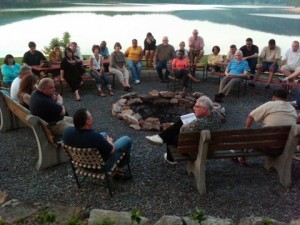Getting the most from your staff retreat
 A staff retreat is time apart from the distractions and press of daily demands. A time to get off the dance floor and up on the balcony to see what is needed most. A facilitator supports the retreat in the following ways:
A staff retreat is time apart from the distractions and press of daily demands. A time to get off the dance floor and up on the balcony to see what is needed most. A facilitator supports the retreat in the following ways:
- You and your team have a partner to help clarify the outcomes you want.
- In designing the retreat, the facilitator has a variety of tools to maximize participation, learning and relationship building, while ensuring that outcomes are achieved’
- During the retreat itself, you have an additional perspective and a skilled resource to analyze and resolve blocks to progress
- A skilled facilitator will build the team’s competency, unity and commitment for a new direction
A facilitated retreat can be helpful in a variety of situations, including the following:
- When a large campaign or a new year is beginning, and you want everyone to be on the same page.
- When there is a change in the leadership team and the staff is unclear about the impact this will have on the culture and direction of the union.
- At year end or at the end of a tough campaign, when success needs to be celebrated, results need to be evaluated and new goals set.
- When your regular routine for an annual retreat needs rejuvenating.
The facilitator will work closely with you to plan, run and evaluate the retreat, including:
- Work with a planning committee to design a draft agenda
- Identify speakers and resources to enhance the retreat.
- Facilitate all or some parts of the actual retreat.
- Provide a follow up report on what was accomplished and open items.
Resource:
Tom Justice and David Jamieson, The Facilitator’s Fieldbook, 2nd Ed. (2006), HRD Press.
Roger Schwarz, The Skilled Facilitator, New & Revised (2002), Jossey-Bass.
Contact us to learn more about facilitated staff retreats.

